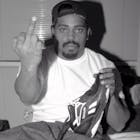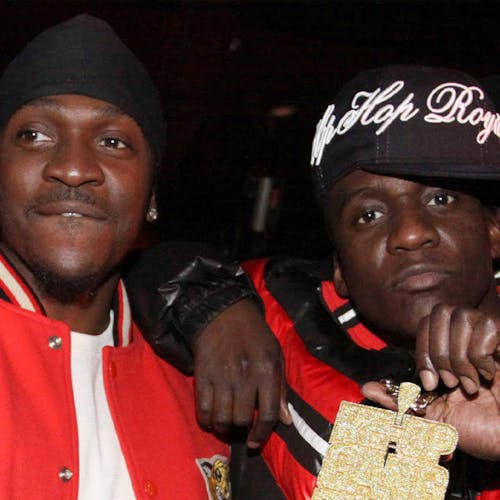
Music saved B-Real’s life—and he’ll be the first to admit it.
As a product of East Los Angeles, gang culture was unavoidable and he eventually became a member of the Neighborhood Family Bloods. At 17, B-Real was shot with a hollow-point .22 caliber bullet during a gang-related shooting. The bullet punctured his lung, and B-Real found himself at a crossroads—he could either continue down a path littered with violence or take another route.
Enter Cypress Hill.
Before dropping out of Bell High School, he’d already befriended aspiring rapper Sen Dog whose brother, Mellow Man Ace, was also interested in rapping. In 1988, the two brothers joined forces with B-Real and New York native DJ Muggs to form DVX (Devastating Vocal Excellence), but it wasn’t long before Mellow Man Ace left the group to pursue a solo career. Subsequently, Sen Dog, B-Real and DJ Muggs changed their name to Cypress Hill, a nod to Cypress Avenue in the South Gate area of Los Angeles County, and continued on as a trio.
In a recent phone interview with Rock The Bells, B-Real looked back fondly on his time in South Gate, even though it wasn’t the easiest place to grow up.
“My family moved around a lot,” he explains. “When my parents were married, we moved around a lot and when they divorced, we moved around a lot. So South Gate was just one of the many cities I lived in, but I made all my lifelong friends in South Gate and that's where I kept my roots. No matter where I went, almost all my friends were there and I would always make my way back there. South Gate was the seed for me because all my best friends came from there and the love for Hip-Hop started there. South Gate is a special place.”
In 1991, Cypress Hill delivered their debut self-titled album via Ruffhouse/Columbia Records—and it was a bona fide hit. Songs such as “How I Could Just Kill A Man” and “Hand On The Pump” bolstered its success and eventually, they had a double-platinum album—but not without making some changes. Around the time they were recording Cypress Hill at Image Recording Studios, B-Real was confronted by DJ Muggs about his voice. He felt it was too average and told him he needed to go another direction or he’d end up ghostwriting for Sen Dog. B-Real took the challenge seriously and looked to New York rapper/visual artist Rammellzee for inspiration.
“I had to switch it up because my voice was not cutting through on any of the songs previously,” he admits. “My writing and my style was there, but the actual tone of my voice was not.”
One day, B-Real and Mellow Man Ace were hanging out and coming up with ideas for songs when B-Real jokingly started rapping over an instrumental using Rammellzee’s high-pitched, nasal-y vocal style.
“Mellow was a big fan of Rammellzee too, so we both started tossing it around and that’s when the idea for ‘Real Estate’ came up and with that voice,” he continues. “At first, I didn't think they were gonna like it. I thought they were gonna say it sounded too much like Rammellzee or [Beastie Boys’] Ad-Rock or something like that because Ad-Rock was a big deal to me then. But I wasn’t trying to yell like him, I was trying to finesse it.”
To his amazement, DJ Muggs and the rest of the group loved it, and B-Real has been rhyming in that style ever since. Muggs told him, “This is the voice you’re gonna have to rock with every time.” But B-Real had to get used to it—and initially, it wasn’t easy.
“I thought people would be annoyed by it,” he says. “Because for me, I was like, ‘Really? Is this really what you want me to go with?’ It’s so different from my speaking voice. When people didn't know what I sounded like, they thought I was going to speak in that crazy voice [laughs].”
While Cypress Hill put them on the map, it was their sophomore album, Black Sunday, that sent them spinning into another stratosphere. Released in 1993, Black Sunday spawned the now-classic singles “Insane In The Brain,” “I Ain’t Going Out Like That,” “When The Shit Goes Down” and “Hits From The Bong.” The album debuted at No. 1 on the Billboard 200, selling more than 261,000 copies in its inaugural week, and became the highest Soundscan recording for a Hip-Hop group. Simultaneously, Cypress Hill made history as the first Hip-Hop group ever to have two albums in the Top 10 at the same time.
DROP YOUR EMAIL
TO STAY IN THE KNOW
Needless to say, it drastically changed their lives, but B-Real never saw it coming—none of them did. As he explains, “Black Sunday took us out of the underground. People heard about us through shows more than they did radio or anything like that. We were building up a reputation, but we weren't getting any kind of radio play. When Black Sunday hit, it propelled us into the mainstream, which we didn't anticipate.”
Fame was something they hadn’t yet experienced on such a high level either. All of sudden, they felt like Elvis or The Beatles whenever they’d go out in public. He recalls, “We went from being able to go anywhere to causing chaos. We couldn't believe how it was happening.”
Thirty years later, Cypress Hill has a star on the Hollywood Walk of Fame, the first Hip-Hop group to receive the prestigious honor. They’ll also become the first Latino Hip-Hop group to perform with the Colorado Symphony. On Thursday (July 20)—the official 30th anniversary of Black Sunday—Sen Dog, B-Real, Eric Bobo and special guest DJ Lord will take over the Mission Ballroom in Denver to play the album in its entirety backed by strings, horns and percussion.
“We pride ourselves on the ability to snap in any scenario,” he says. “We’ve done a lot of different genres within Hip-Hop. We’ve always tried to think outside of the box and do different things, so this is just one of those other challenges for us. We’ve been doing a little bit of rehearsals to some of the orchestration that they sent back as reference. They're really good and so is the music they came up with. It’s very powerful, so we're excited.”




